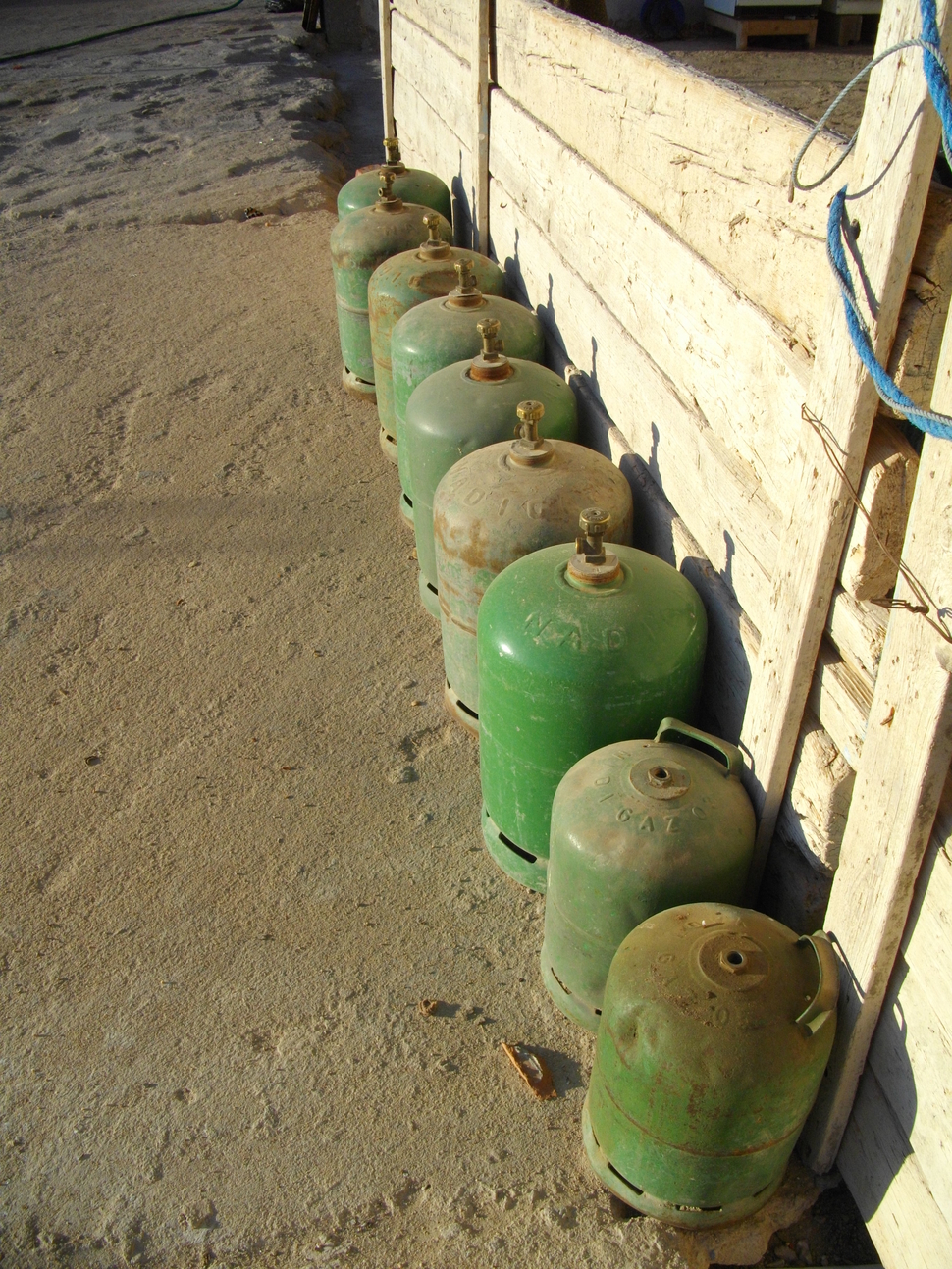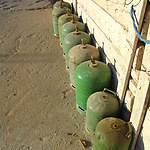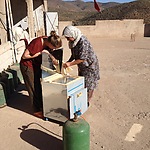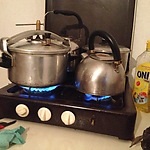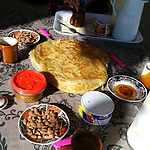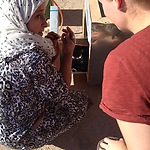The first day has been mainly about getting to know each other, to make the woman more comfortable. The second day we spend the whole day running along with the woman, observing and asking questions. The last day we gave a demonstration with the Fortune Cooker.
Test person and test location
The test location is Aïn Sfa, a village in the mountains of BniSnassen, about one and a half hour away from Saïdia. The test person is named Rabeha, a Moroccan woman that runs a Soufi-centrum together with her husband. They have two daughters who both study in Oujda, where they also live. The Soufi-centrum is a spiritual centrum that people visit. Rabeha takes care of herself, her husband ánd all the guests. Thus, one should take into account that quantities are likely to be much higher than they would be in a ‘normal’ household. All the household activities are done by Rabeha.
Findings regarding direct influence
Facilities around the house
First of all, there’s a lack of basic facilities. Rabeha has, as one of the only ones in the neighbourhood, flowing water, but only cold water. Water for showering has to be heated on fire. There is a well at which water can be obtained. The water pump has a motor that runs on electricity. Electricity is available via rechargeable cards, this costs them around €90,- per month.
Secondly they do not own a car, so when they have to go the village, they have to wait for a lift or order a taxi.
Cooking facilities
The cooking takes places at the first floor, above the Soufi-centre. There is enough access to sunlight. The main fuel that is being used is gas and sometimes wood is being used to heat water. One big bottle of gas costs 40 Dirham (around €4,-) and lasts one week. They always have about thirteen bottles in stock.
There is a refrigerator and a freezer, they are placed outside, under the shed. There is also a gas oven for bread and a fire pit. Inside their house is a four-burner gas stove.
Cooking times and activities
Nine to ten hours were spent on cooking during the day. Almost the whole day revolves around cooking and eating. For example when we went for a walk, Rabeha was picking wild spinach to make a pesto with for dinner. However, other things are being done while food is prepared, such as doing the dishes, washing clothes and other, mainly household activities. Meanwhile also guests are coming and they are given tea with bread and sweets. It is remarkable that cutting boards are rarely used. She cuts everything in her hand, a cutting board is only used when something (like spinach) has to be cut into very small pieces.
Because Aïn Sfa is located in the mountains, the sun goes down around 16:15. Thus, dinner is always cooked in the dark during the winter months.
Cooking tools
Rebeha makes use of different kinds of pots and pans, such as; a tajina (a heavy, flat cast iron pan), frying pan, saucepan and a pressure pan. During our stay, for each dish multiple kinds of pots were used, together with different cooking techniques, such as boiling, baking, roasting and grilling.
Findings regarding indirect influence
Rabeha cooks mainly by intuition. Most of the times she smells when the food is ready, other times she hears it (like popping almonds). Sometimes she looks at the food. She does not taste the food very often, because she is also used to cooking during Ramadan, a month in the Islamic calendar in which people fast during daytime. She could always give an indication of the needed cooking time of specific ingredients. However, she does not seem to use the time as a guidance while cooking.
She learned most of the dishes from her family, mainly her mother and her sister. There are some traditional recipes that are made in a specific way. These are dishes that are being served at special occasions. She herself makes and eats dishes that are more simple, such as a vegetable soup, these dishes have far less fixed recipes. Sometimes she experiments with spices. Another example that she experiments is that she had seen the Moroccan pancakes in a store being bigger than she was used to, then she experimented with her sister on how to make theirs as big. She also watches cooking programmes on television. She does not copy these recipes, as some of the ingredients are not available in her environment, but she does derive new ideas from it.
She has always used a pressure pan. According to her, she prefers the taste of a tajine, but a pressure pan is more ‘economique’, which means that the food is ready faster and therefore it saves both time and gas consumption.
Findings regarding the Fortune Cooker demonstration
For the Zouwja (The Soufi-centrum) the Fortune Cooker would be too small, because Rebeha receives many guests. However, Rabeha thinks the format would be good for a normal family. She mentions that meals for feasts cannot be prepared on the Fortune Cooker, but light meals can.
She does not know yet if she would get enough feedback on the process from the Fortune Cooker, as this comes with experience. However, she trusts the product to function.
After our explanation, she seemed to understand the product and its functioning well. For example, she directly understood that the drawer should not be completely closed to make sure the gas gets enough oxygen.
As a criticism, she also mentioned the danger of the plastic hose of the gas bottle, as it would become too hot in the solar box for plastic. A copper hose would have been better.
The biggest benefit she sees in the Fortune Cooker is time saving. When she cooks on fire she always has to check over and over if the fire is still good, while with the Fortune Cooker she could just let it be, after turning off the gas. Besides, wood is hard to kindle in the winter, due to damp.
Regarding the part of turning of the gas, she mentions that she would turn on the gas until the water boils and would then turn it off.
Heaving the Fortune Cooker to the sun is said not to be a problem.
An additional advantage of the Fortune Cooker in Rabeha’s case would be the heating of water (and staying warm) for ablutions, the dishes and showering.
Conclusions
Direct influence
Not every meal can be prepared in the Fortune Cooker. Firstly, traditional dishes (mostly prepared for feasts) use more than one pan at the same time. Also, with every dish bread is being served. At this point, the Fortune Cooker is not able to bake bread, neither grilling or roasting. As a lot of fuel and electricity is being used, the Fortune Cooker could be beneficial in reducing costs. In this case, most of the costs are for electricity. To reduce these, the Fortune Cooker could be linked to a battery on solar energy.
Food is being prepared at the first floor, which means that the Fortune Cooker has to be carried upstairs. When this would be a one-time action, it would not be a problem. Otherwise, the Fortune Cooker is too heavy and too big to lift on your own. The lifting of the Fortune Cooker should thus be improved. As almost the whole day there is something being cooked, while sometimes other things are being done, the Fortune Cooker could be beneficial in keeping food warm.
As dinner is cooked in the dark, during the winter months solar warmth cannot be used for cooking dinner.
Indirect influence
It is yet unclear whether Rabeha is able to use the same methods of cooking she uses now with the Fortune Cooker. Currently, she uses her senses to know if the food is ready, so the Fortune Cooker should be best designed to be able to do the same. For example, using highly reflective material on the inside, to increase sight, together with reducing moisture on the glass that blocks the view.
However, she also seems to understand the cooking process very well and the fact that she experiments with dishes indicates a higher capability to adaptations. These adaptations are only in the field of recipes and dishes, as she has always cooked with the current cooking devices. For these reasons it is likely that she is able to adapt her cooking methods to the Fortune Cooker.
The use of a pressure pan indicates that time is important. Therefore, for Rabeha, preparing food on the Fortune Cooker should not take more time than cooking in the current situation.
Fortune Cooker demonstration
As traditional meals for special occasions are more complicated, they cannot be prepared in the Fortune Cooker. Thus, the Fortune Cooker will not be a self-contained product. In Morocco it cannot replace all the other cooking devices, as food is a big part of the culture. Feast meals will always be prepared and these cannot (yet) be prepared on the Fortune Cooker. On the other hand, the Fortune Cooker can be beneficial for other purposes than cooking meals. It can, for example, heat water for households that do not have access to warm (flowing) water. Also, the product can be beneficial as an extra device to keep the food warm, especially in the winter or to prepare light meals and thereby reduce fuel consumption. Thereby, the Fortune Cooker can, according to Rabeha be more reliable compared to gas or wood, as nothing can go wrong from the moment the gas is turned off.
Finally, the plastic hose should be replaced with a copper one.
In general the user was positive about the product, because of its reliability, its ability to save time and gas consumption and the fact that water or food can be kept warm. However, the Fortune Cooker cannot be used in every situation.
DISCUSSION
As guests are treated very well in the Moroccan culture, the results of this research might not be entirely representative. It should be taken into account that average Moroccan families live more sober and eat less luxurious than we experienced. Also, it is possible that the test person was more positive about the product or did not give all her critics out of politeness.
